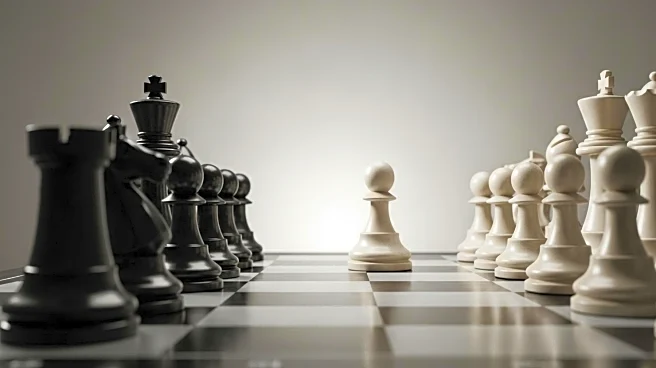What's Happening?
Israeli chess players have decided to withdraw from the international Open Basque Country tournament in Sestao, Spain, due to the ongoing conflict in the Gaza Strip. The decision was reported by El País and involves seven Israeli players who were offered the option to compete under the World Chess Federation's flag instead of their national flag. Miguel-Ángel Del Olmo, president of the Sestao chess club, initially considered banning the Israeli players but was compelled to allow their participation following intervention from FIDE, the international chess federation. FIDE warned that removing the Israeli flags would result in the tournament not being rated, affecting the players' ability to earn norms or Elo points. In a show of solidarity, the tournament organizers have decided to display the Palestinian flag alongside those of other participating countries.
Why It's Important?
The withdrawal of Israeli players from the tournament highlights the intersection of sports and international politics, particularly in relation to the Israeli-Palestinian conflict. This incident underscores the broader impact of geopolitical tensions on global sporting events, where athletes may face pressure to take political stances. The decision by the tournament organizers to display the Palestinian flag reflects a growing trend of sports entities taking positions on international issues, which can influence public opinion and diplomatic relations. The situation also raises questions about the role of international sports federations like FIDE in mediating such conflicts and maintaining the integrity of competitive events.
What's Next?
The withdrawal of the Israeli players may prompt further discussions within the international chess community and other sports organizations about how to handle similar situations in the future. It could lead to increased scrutiny of the policies governing the participation of athletes from conflict-affected regions. Additionally, the decision to display the Palestinian flag might provoke reactions from various stakeholders, including governments and advocacy groups, potentially influencing future tournament policies and international sports diplomacy.
Beyond the Headlines
This development may contribute to a broader dialogue about the ethical responsibilities of sports organizations in addressing political conflicts. It highlights the potential for sports to serve as a platform for political expression and the challenges that arise when balancing competitive fairness with political sensitivities. The incident could also influence how other international sports events approach similar issues, potentially leading to new guidelines or policies aimed at preventing political disputes from overshadowing athletic competition.









